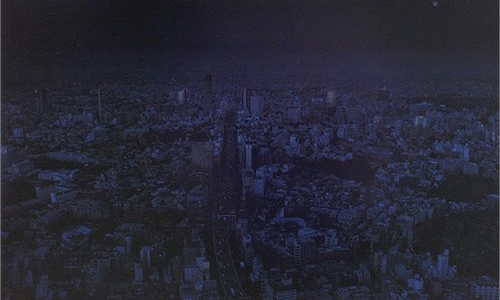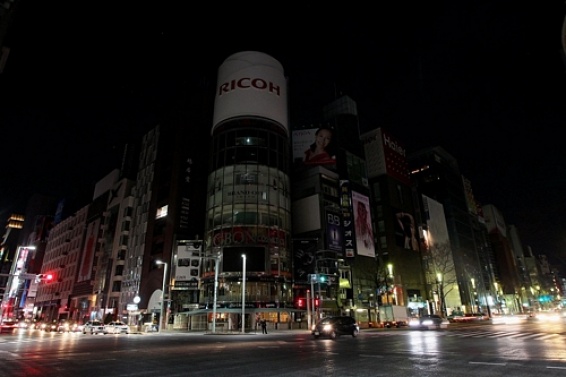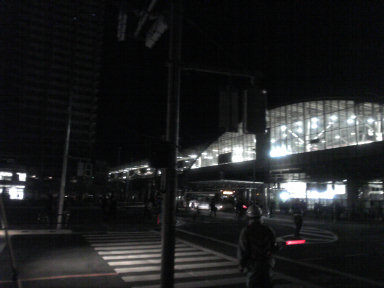Light Out, Tokyo
 Sunday, March 20, 2011 at 4:49PM
Sunday, March 20, 2011 at 4:49PM
 I had an interesting conversation the other day about electricity, of all things, with a man who used to work for Kyûshu Electric (Kyûden), our local power company.
I had an interesting conversation the other day about electricity, of all things, with a man who used to work for Kyûshu Electric (Kyûden), our local power company.
The scheduled electrical power stoppages in the Kantô area had been in the news that day. The power outages, which were a result of damage to nuclear reactors in Fukushima after last week's horrendous tsunami had begun earlier in the week and were causing great disruption to people's lives. For one, it wasn't always clear when and where the black outs would occur, and just because TEPCO had announced that a particular area was going to go dark from, say, five o'clock that evening didn't necessarily mean that every portion of that area would have its electricity cut off at precisely that time. Thanks to this confusion, there were 122 cases of people getting trapped in elevators. One elderly woman who was stuck for three hours in her apartment building's elevator told a reporter that she nearly went mad. "It felt as if the compartment were getting smaller and smaller and smaller." (I think I could deal with the claustrophobia, not being able to pee for three hours . . . )
As is only natural, the black outs had unforeseen consequences, one of which was that power cut off from, for instance, Group A ended up affecting the water supply in Group B. A businessman whose office is in Group C couldn't contact a client in Group D, and so on. Train schedules were also thrown into disarray.
 So, I asked the former Kyûden engineer, "Instead of these silly, seemingly random 3-hour-long blackouts wouldn't it make much more sense to turn everyone's energy off from 12pm - 3pm? That way everyone would know when the power would be out and could manage their lives around the outage."
So, I asked the former Kyûden engineer, "Instead of these silly, seemingly random 3-hour-long blackouts wouldn't it make much more sense to turn everyone's energy off from 12pm - 3pm? That way everyone would know when the power would be out and could manage their lives around the outage."
Sounded reasonable to me. But then again, what the fuck do I know about electricity?
"Electricity can't be stored," he answered. "Either you have it or you don't."
He went on to explain that the area supplied by TEPCO, a sprawling regions that produces 40% of Japan's economic output, had a peak energy demand of some 45 million kilowatts. With the Fukushima nuclear reactors out of commission, TEPCO's energy capacity had dropped some 25% to 38.5 million kilowatts. By comparison, Kyûden, which supplies the island of Kyûshû with power, has a capacity of about 14 million kilowatts. There was no way to boost energy production in a major way, so all that was left to do was reducing demand. Hence, the black outs.
"What about Kyûden? Can't regional power companies like Kyûshû Denryôku step in?"
"Yes, it can," he replied, "but only to an extent."
When the electric grid was first being laid in Japan, the Tôkyô Electric Lamp Company purchased an alternator made by the German company, Siemens, and another electric company located in Ôsaka bought one from GE. Thanks to those two purchases, Japanese power plant frequency would forever be divided--60Hz in the west and 50Hz east of the Fuji River in Shizuoka Prefecture.
 In order for Kyûden to supply the Kantô area with electricity, the company must first sent power to Chûgoku Denryoku which will then pass it on to Kansai Denryoku, and from there to Chûbu Denryoku, where, I believe, it will be converted, and finally provided to TEPCO. All that work for an extra million kilowatts of power, which brings us back to the knotty issue of the scheduled power stoppages.
In order for Kyûden to supply the Kantô area with electricity, the company must first sent power to Chûgoku Denryoku which will then pass it on to Kansai Denryoku, and from there to Chûbu Denryoku, where, I believe, it will be converted, and finally provided to TEPCO. All that work for an extra million kilowatts of power, which brings us back to the knotty issue of the scheduled power stoppages.
In recent days, however, an appeal by the government for the public to curb their consumption of electricity has had the effect of lowering demand to about 30 million kilowatts, just shy of TEPCO's present capacity. If citizens can continue to be convinced to conserve energy--if not out of a desire to avoid causing trouble for others (meiwaku) then by higher fees for electricity--further black outs might be unnecessary.
Reader Comments